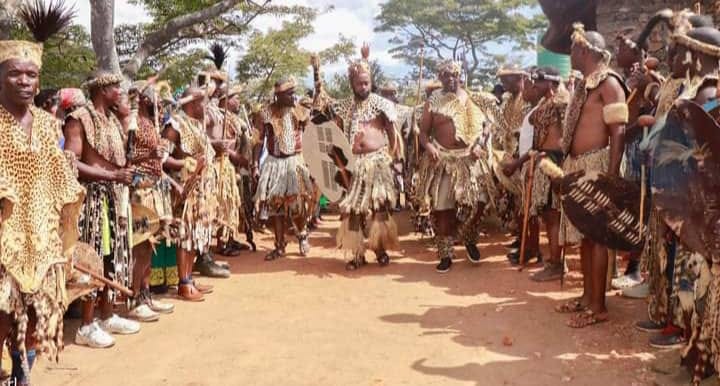Ngoni Culture Fades as Modernization Threatens Traditional Art, Practices
The Ngoni, who settled in Malawi in 1840 after fleeing conflict in South Africa, have long been associated with a rich tapestry of customs tied to animals and natural resources.
MZIMBA, Malawi— In the rolling hills of northern Malawi, the Ngoni people face a cultural crossroads. Once known for their fierce warriors and distinctive traditions, they now grapple with the erosion of their heritage as modernization sweeps through their communities, writes Ed-Grant Ndoza, MANA.
The Ngoni, who settled in Malawi in 1840 after fleeing conflict in South Africa, have long been associated with a rich tapestry of customs tied to animals and natural resources.
Their famous war dance, Ingoma, showcases intricate artwork using animal skins and wildlife specimens. However, these practices are increasingly under threat.
"Foreign cultures pose a big threat to the Ngoni land, which previously was admired for its values and beliefs that promoted moral uprightness," says Kingsley Jere, Secretary General of the Mzimba Heritage Association (Mziha).
One striking example of fading traditions is the "Zimpeto" art of meat preservation.
This process, which involved allowing fly larvae to infest meat, was once a cultural cornerstone. Jane Dorica Mzguli, a skilled potter from Kausiku Nyoni Village, recalls, "No one fell sick, let alone open bowels after consuming Zimpeto tenderised meat."
Yet, as refrigeration becomes more common, such practices are disappearing. Similarly, Mzguli's pottery skills, once vital for brewing beer and storing food, are at risk of being lost without a female heir to continue the tradition.
Environmental degradation further compounds the challenge. Ndawazake Thole, spokesperson for the Jere Ngoni, explains how elders once used natural signs to predict weather patterns and crop yields.
"They knew that massive flowering of trees was a sign of first rains, and indeed rain used to come," he says. However, deforestation and climate change are disrupting these age-old forecasting methods.
In response, Mziha plans to establish a tourism centre at Hora Mountain, a significant historical site for the Ngoni.
"The centre will serve as a training centre for youths to master Ngoni culture and art," Jere explains, hoping to preserve traditions like the Ingoma dance, language, and craftsmanship.
This cultural shift is particularly evident in the changing attitudes towards traditional foods and beverages. Once a staple, the local opaque beer brewed in clay pots is now a rarity.
"Rarely will one notice women brewing local beer or sweet beer in clay pots," observes Juliet Nyoni from Kausiku Nyoni Village. Instead, commercially produced spirits and packaged beers have become popular, especially among the youth.
The impact extends beyond culinary traditions. The Ngoni's close relationship with livestock, once a defining characteristic of their society, is waning.
This shift has implications not just for cultural identity but also for economic practices. Cattle, once a symbol of wealth and a crucial component of the dowry system, are losing their central role in Ngoni society.
The Ingoma dance, a powerful expression of Ngoni culture, faces its own challenges.
"The dance is incomplete without women behind the impi who offer lead vocals," explains a cultural expert. However, as younger generations are drawn to modern forms of entertainment, fewer people are learning these traditional performances.
Environmental changes have also impacted traditional practices. Eric Brahm, writing for Substark Magazine, notes, "Every tribe or society has its own culture and art that make people's lives complete and worthy."
For the Ngoni, this completeness was closely tied to the natural world. The loss of wildlife and forests has made it difficult to source materials for traditional crafts and rituals.
Despite these challenges, there are efforts to preserve and adapt Ngoni culture.
The annual Umuthetho celebration at Hora Mountain serves as a rallying point for cultural preservation.
"Ngoni chiefs from Zambia, South Africa and Tanzania attend the cultural event," says a local official, highlighting the transnational nature of Ngoni identity.
Education is seen as key to cultural preservation. "We need to teach our children about their heritage," says a local teacher. "It's not about rejecting modernity, but about finding a balance."
Some are exploring innovative ways to keep traditions alive. A group of young Ngoni artists are experimenting with digital art to recreate traditional designs, while others are using social media to share Ngoni language lessons.
The challenge of preserving Ngoni culture reflects a broader global issue of indigenous cultures adapting to rapid change.
As Abid Hussain, an Al Jazeera journalist, observed in a different context, cultural conflicts often arise from misunderstandings of values and beliefs.
For the Ngoni, the path forward involves careful navigation between honouring their past and embracing their future. As one elder put it, "Our culture is not static.
It has always changed. The key is to keep our core values while we adapt to new realities."
As the sun sets over the hills of Mzimba, the sound of a distant horn trumpet echoes, a reminder of a rich heritage fighting to find its place in the modern world.
The story of the Ngoni is far from over; it is merely entering a new chapter, one that will be written by those who cherish their past while boldly facing the future.



